2007 Hyundai H-1 (Grand Starex) tow
[x] Cancel search: towPage 88 of 284

2
INSTRUMENTS AND CONTROLS
21
B350B01A-AAT Windshield Washer Operation
To use the windshield washer, pull the wiper/washer lever toward the steer- ing wheel. When the washer lever isoperated, the wipers automatically make two passes across the wind- shield. The washer continues to oper-ate until the lever is released. HSRFL2116
Windshield wipers 1.OFF
2.INT : The
interval between wipers
can be varied from 2 to 10 seconds by turning.
3.LOW : Speed operation the interval adjuster switch.
4.HIGH : Speed operation the interval
adjuster switch.
NOTE:
o Before operating the wipers in cold weather, check to be sure that the wiper blades are not frozen to the windshield. Attempting to operate the wipers while the blades arefrozen to the windshield could cause the motor to burn out.
o If the wipers stop during opera-
tion because of ice or some otherobstruction on the windshield, the wiper motor could burn outeven if the wiper switch is turned off. If this occurs, promptly stop the vehicle, turn off the ignitionswitch, and clean the windshield to allow proper wiper operation.
o Do not use the wipers when the
windshield is dry:doing so couldscratch the windshield and wear the blades prematurely.
WINDSHIELD WIPER AND WASHER SWITCH
C180A02P-GAT The windshield wiper and washer switch can be operated with the ignition switch at the "ON" or "START" position. Movethe switch to operate the windshield wipers or spray the washer fluid. HSRFL2111
HSRFL2111-1
Type A Type BHSRFL2116-1
Type A Type B
Page 101 of 284
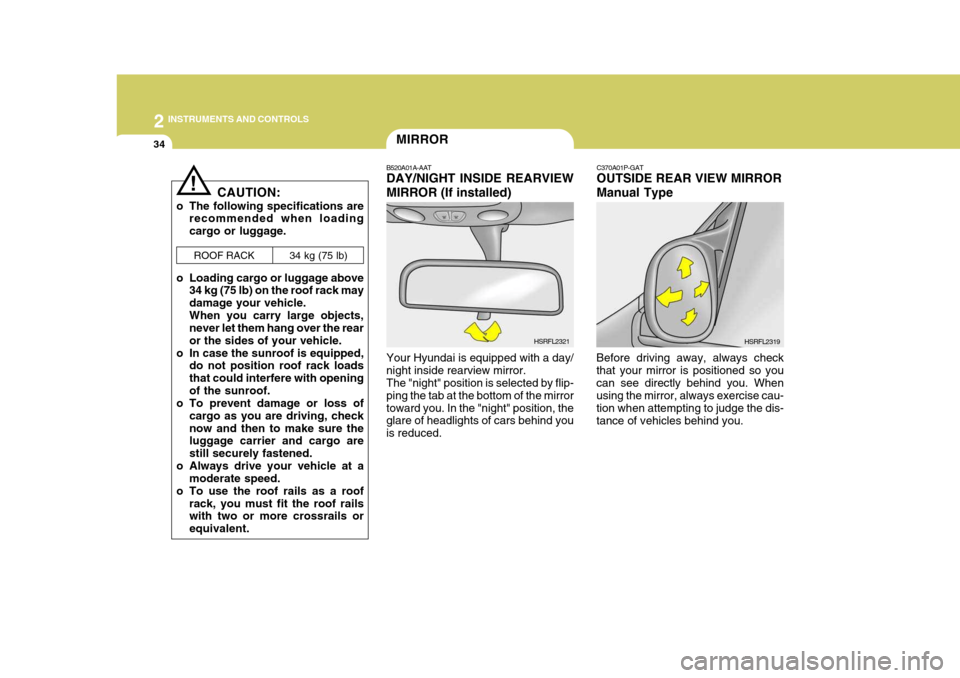
2 INSTRUMENTS AND CONTROLS
34MIRROR
B520A01A-AAT DAY/NIGHT INSIDE REARVIEW MIRROR (If installed) Your Hyundai is equipped with a day/ night inside rearview mirror. The "night" position is selected by flip- ping the tab at the bottom of the mirrortoward you. In the "night" position, the glare of headlights of cars behind you is reduced. HSRFL2321C370A01P-GAT OUTSIDE REAR VIEW MIRROR Manual Type
Before driving away, always check that your mirror is positioned so youcan see directly behind you. When using the mirror, always exercise cau- tion when attempting to judge the dis-tance of vehicles behind you. HSRFL2319
CAUTION:
o The following specifications are recommended when loadingcargo or luggage.
o Loading cargo or luggage above 34 kg (75 lb) on the roof rack maydamage your vehicle.When you carry large objects, never let them hang over the rear or the sides of your vehicle.
o In case the sunroof is equipped, do not position roof rack loadsthat could interfere with openingof the sunroof.
o To prevent damage or loss of
cargo as you are driving, checknow and then to make sure the luggage carrier and cargo are still securely fastened.
o Always drive your vehicle at a moderate speed.
o To use the roof rails as a roof rack, you must fit the roof rails with two or more crossrails or equivalent.ROOF RACK
34 kg (75 lb)
!
Page 111 of 284
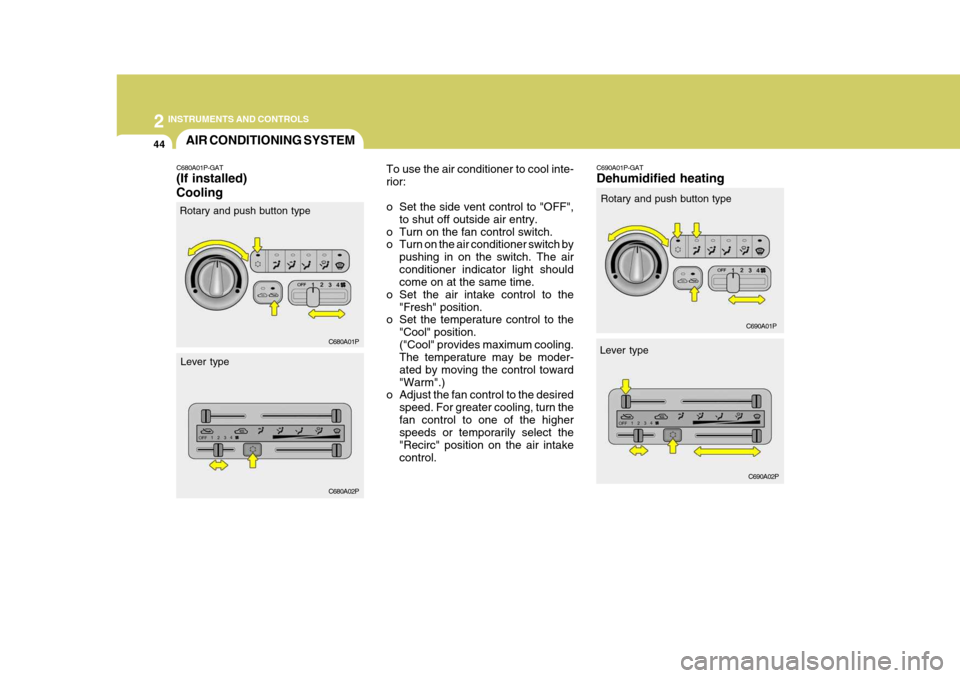
2 INSTRUMENTS AND CONTROLS
44AIR CONDITIONING SYSTEM
C680A01P-GAT (If installed) Cooling To use the air conditioner to cool inte- rior:
o Set the side vent control to "OFF",
to shut off outside air entry.
o Turn on the fan control switch.
o Turn on the air conditioner switch by pushing in on the switch. The air conditioner indicator light should come on at the same time.
o Set the air intake control to the "Fresh" position.
o Set the temperature control to the
"Cool" position. ("Cool" provides maximum cooling. The temperature may be moder- ated by moving the control toward"Warm".)
o Adjust the fan control to the desired
speed. For greater cooling, turn thefan control to one of the higher speeds or temporarily select the "Recirc" position on the air intakecontrol.
C680A01P C680A02P
Rotary and push button type
Lever type Rotary and push button type
Lever type
C690A01P-GAT Dehumidified heating
C690A01P
C690A02P
Page 116 of 284
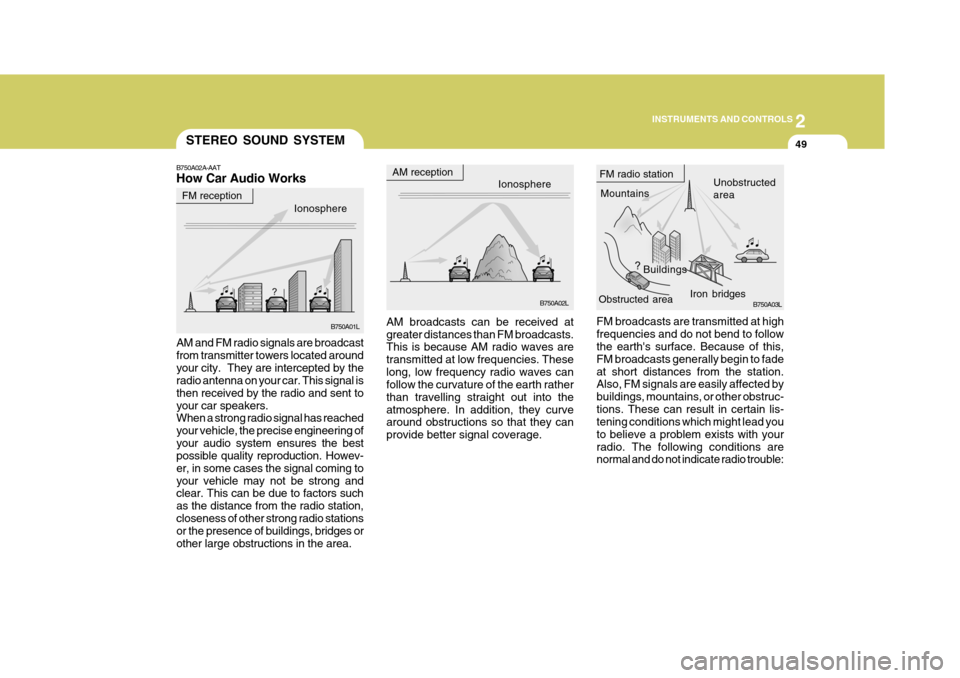
2
INSTRUMENTS AND CONTROLS
49STEREO SOUND SYSTEM
B750A02A-AAT How Car Audio Works
FM broadcasts are transmitted at high frequencies and do not bend to follow the earth's surface. Because of this, FM broadcasts generally begin to fadeat short distances from the station. Also, FM signals are easily affected by buildings, mountains, or other obstruc-tions. These can result in certain lis- tening conditions which might lead you to believe a problem exists with yourradio. The following conditions are normal and do not indicate radio trouble:
AM broadcasts can be received at greater distances than FM broadcasts. This is because AM radio waves are transmitted at low frequencies. Theselong, low frequency radio waves can follow the curvature of the earth rather than travelling straight out into theatmosphere. In addition, they curve around obstructions so that they can provide better signal coverage.
AM and FM radio signals are broadcastfrom transmitter towers located aroundyour city. They are intercepted by the radio antenna on your car. This signal is then received by the radio and sent toyour car speakers. When a strong radio signal has reached your vehicle, the precise engineering ofyour audio system ensures the best possible quality reproduction. Howev- er, in some cases the signal coming toyour vehicle may not be strong and clear. This can be due to factors such as the distance from the radio station,closeness of other strong radio stations or the presence of buildings, bridges or other large obstructions in the area. Ionosphere
B750A02L
AM reception
Mountains
Buildings Unobstructed area
FM radio station
B750A03L
Ionosphere
FM reception
B750A01L Obstructed area
Iron bridges
Page 163 of 284
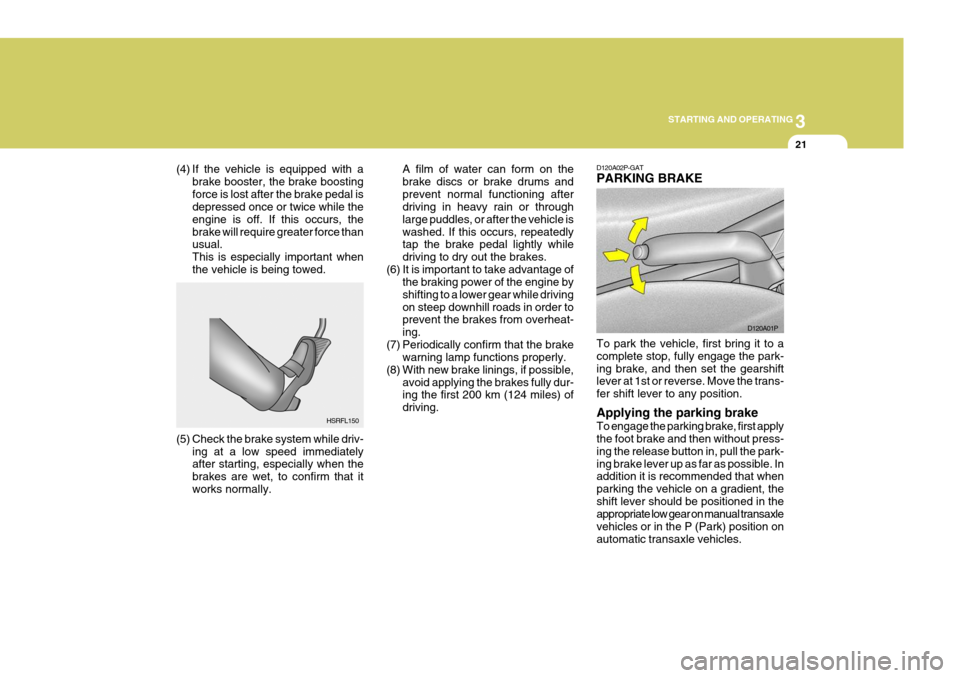
3
STARTING AND OPERATING
21
(4) If the vehicle is equipped with a
brake booster, the brake boosting force is lost after the brake pedal is depressed once or twice while the engine is off. If this occurs, thebrake will require greater force than usual. This is especially important whenthe vehicle is being towed. A film of water can form on thebrake discs or brake drums andprevent normal functioning after driving in heavy rain or through large puddles, or after the vehicle iswashed. If this occurs, repeatedly tap the brake pedal lightly while driving to dry out the brakes.
(6) It is important to take advantage of the braking power of the engine byshifting to a lower gear while drivingon steep downhill roads in order to prevent the brakes from overheat- ing.
(7) Periodically confirm that the brake warning lamp functions properly.
(8) With new brake linings, if possible, avoid applying the brakes fully dur- ing the first 200 km (124 miles) of driving.
HSRFL150
(5) Check the brake system while driv- ing at a low speed immediately after starting, especially when the brakes are wet, to confirm that itworks normally. D120A02P-GAT PARKING BRAKE To park the vehicle, first bring it to a complete stop, fully engage the park-ing brake, and then set the gearshift lever at 1st or reverse. Move the trans- fer shift lever to any position. Applying the parking brake To engage the parking brake, first apply the foot brake and then without press- ing the release button in, pull the park-ing brake lever up as far as possible. In addition it is recommended that when parking the vehicle on a gradient, theshift lever should be positioned in the appropriate low gear on manual transaxle vehicles or in the P (Park) position onautomatic transaxle vehicles.
D120A01P
Page 173 of 284

3
STARTING AND OPERATING
31
D180J01P-GAT Weather strip To prevent freezing of the weather strip on the doors, the roof, etc., theyshould be treated with silicone grease. D180K01P-GAT Snow tires The use of snow tires is recommended for driving in snow and ice. To pre- serve driving stability, mount snow tires of the same size and tread pattern onall four wheels. Snow tires worn more than 50% are no longer suitable for use as snow tires.Snow tires which do not meet specifi- cations must not be used. NOTE: The laws and regulations concern- ing snow tires (driving speed, re- quired use, type, etc.) vary. Find out and follow the laws and regula-tions in your area. D180L01P-GAT Tire chains If tire chains are to be used, be sure that they are mounted on the rearwheels. Use only tire chains which are de- signed for use with the tires mountedon the vehicle; use of the incorrect size or type of chain could result in damage to the vehicle body.Before driving over long stretches of road which are free of snow, you should remove the chains to avoid damage tothe tires. NOTE: The laws and regulations concern- ing tire chains vary. Find out and follow the laws and regulations in your area.
D180H01P-GAT Parking brake If the atmospheric temperature is be- low freezing, park the vehicle with thegearshift lever in 1st or reverse and do not engage the parking brake. If the parking brake is engaged and there ismoisture on the brake linings, the lin- ings could become frozen to the brake drums, making it impossible to releasethe parking brake. When parking on a steep slope, turn the front wheels in towards the kerband chock the wheels.
D180I01P-GAT Washing the vehicle The salt and other chemicals spread on winter roads in some areas can have a detrimental effect on a vehicle body. You should therefore wash thevehicle as often as convenient in ac- cordance with our care-instruction. Have a preservative applied and theunderfloor protection checked at an authorized HYUNDAI dealer before and after the cold weather season.
Page 177 of 284

4
Tools and Jack ............................................................. 4-2
Spare Tire ..................................................................... 4-3
If You Have a Flat Tire ................................................. 4-6
Changing a Flat Tire ..................................................... 4-7Towing........................................................................ 4-13
Bleeding the Fuel System .......................................... 4-18
Removal of Water from the Fuel Filter ....................... 4-19
If the Engine Will Not Start ......................................... 4-20
Jump Starting ............................................................. 4-21
If the Engine Overheats ............................................. 4-22
Checking and Replacing Fuses ................................. 4-24
Headlight Aiming Adjustment ..................................... 4-26
Replacement of Light Bulbs ....................................... 4-27
Bulb Wattage .............................................................. 4-35
Fuse Panel Description .............................................. 4-37
IN CASE OF EMERGENCY
4
Page 178 of 284
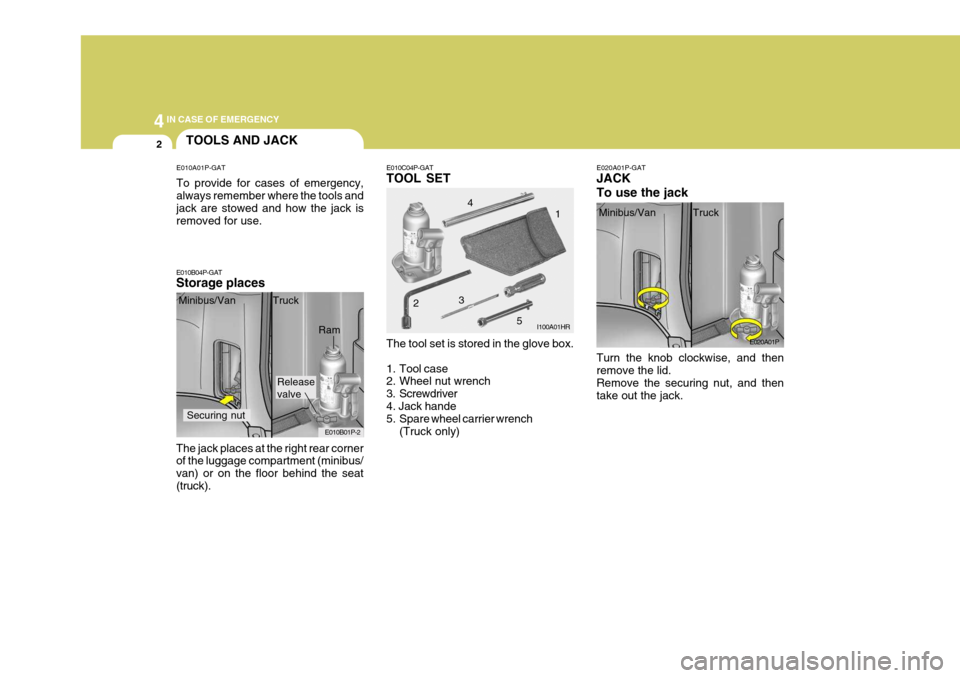
44IN CASE OF EMERGENCY
2
Release valve
TOOLS AND JACK
E010A01P-GAT To provide for cases of emergency, always remember where the tools and jack are stowed and how the jack is removed for use.
E010B04P-GAT Storage places E010C04P-GAT TOOL SET
E020A01P-GATJACK To use the jack
The jack places at the right rear corner of the luggage compartment (minibus/ van) or on the floor behind the seat(truck). Minibus/Van Truck
The tool set is stored in the glove box.
1. Tool case
2. Wheel nut wrench
3. Screwdriver4. Jack hande
5. Spare wheel carrier wrench(Truck only) Turn the knob clockwise, and then remove the lid. Remove the securing nut, and then take out the jack.
E010B01P-2 I100A01HR
E020A01P
Minibus/Van Truck
Securing nut
Ram 2
34
1
5